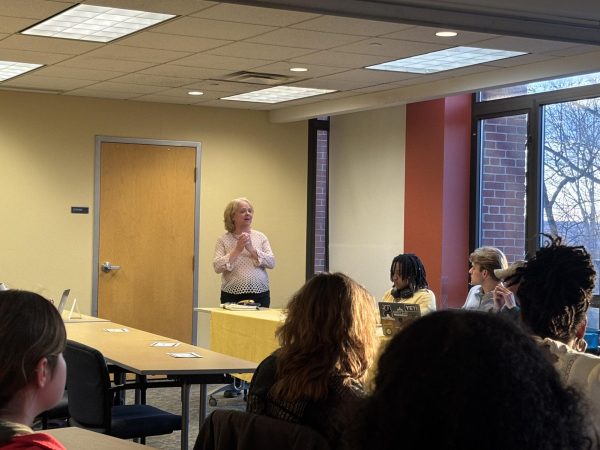Dodge kicks off spring faculty lecture series
As the spring 2019 semester begins, with it comes the Karl W. Weiss, ’87, Faculty Lecture Series.
Assistant Professor of Mathematics Craig Dodge delivered a lecture titled “What I Learned From the English Department About Teaching Mathematics Courses” at 7 p.m. Wednesday, Jan. 23, in room 301/302 of the Henderson Campus Center, kicking off the spring portion of the series.
The lecture primarily covered topics of language consistency and information transfer in the mathematics department and the difficulties of creating that environment for students.
For Dodge, the language in mathematics means more than creating universal definitions for terms.
“In terms of actually doing mathematics, language and the precision of language ends up being the entire way we produce knowledge within our field,” Dodge said. “We are extraordinarily careful about the things we say and (it is) incredibly important that we understand language so that the reader is very clear about what (the) intentions are.”
Knowing language is key when trying to understand how someone proved a math concept, Dodge said. If terms are not clear, students are left to interpret the information differently which is problematic.
“In order to do a mathematical proof, the author must be absolutely clear,” Dodge said. “There is no room for interpretation whatsoever when I am writing a proof.”
Dodge began understanding the challenges of teaching the consistency of language for his students after teaching Math 205 at Allegheny College. His primary concern was the multiple definitions certain words had for students that pertained to the course.
“How do I deal with this issue of different words connecting in essentially bad ways and in both good ways,” asked Dodge. “How do I not cut off this good intuition but help students recognize when students are bringing in previous information that is actually to their detriment?”
It was noticing this that led Dodge to seek different ways to create consistent language in the classroom. Language consistency is the idea of having a standard definition of terms.
To do this, Dodge began talking to faculty, specifically, Valerie Prince, former associate professor of English at Allegheny. During their conversations, Prince gave ideas to Dodge about how to use the exploration of words to create awareness of certain connections in order to restrict the language used in the classroom.
“It can help them recognize, ‘yes, I do have these connections,’” Dodge said. “Some (words) are useful and be very aware of the ones that aren’t.”
Understanding the connections that are present with the language was not the only technique Dodge implemented in his classroom. He also continued to look for more ways to make sure his students fully grasped the importance of language.
Continuing with the theme of faculty assistance, Dodge used information from other courses to aid in the transfer of knowledge for students going through the mathematics curriculum.
“The entire prerequisite structure here of mathematics is built on the idea of strip transfer,” Dodge said. “Knowledge that you are going to gain in one course is going to transfer to the next one, and you are going to be able to use that.”
However, this does not mean that students are always able to see the connections certain classes have with each other.
“There are a number of resources available on campus, and this time it came in the form of FS 101 and 102 workshops,” Dodge said.
These workshops helped Dodge connect the consistency of language to the transfer of information for his students, and by using FS courses as a reference, Dodge was able to improve the overall understanding of his students.
Tomoka Mano, ’22, was impressed by the lecture and is now considering taking courses with Dodge.
“It helped me feel a little bit more comfortable with what I am getting into … it was helpful to hear this presentation” Mano said.
Professor of Mathematics Rachel Weir was also in attendance and said she was impressed by the level of commitment and care he puts into his work for his students.
“I think for me, having worked with Craig, it’s about how thoughtful he is about his teaching and how much he cares,” Weir said.
Dodge ultimately wanted students to know that learning is important in any discipline.
“You end up learning from unexpected places,” Dodge said. “The number of times I added to my own knowledge and learned something new, from someplace I didn’t actually expect to, has been tremendous.”









